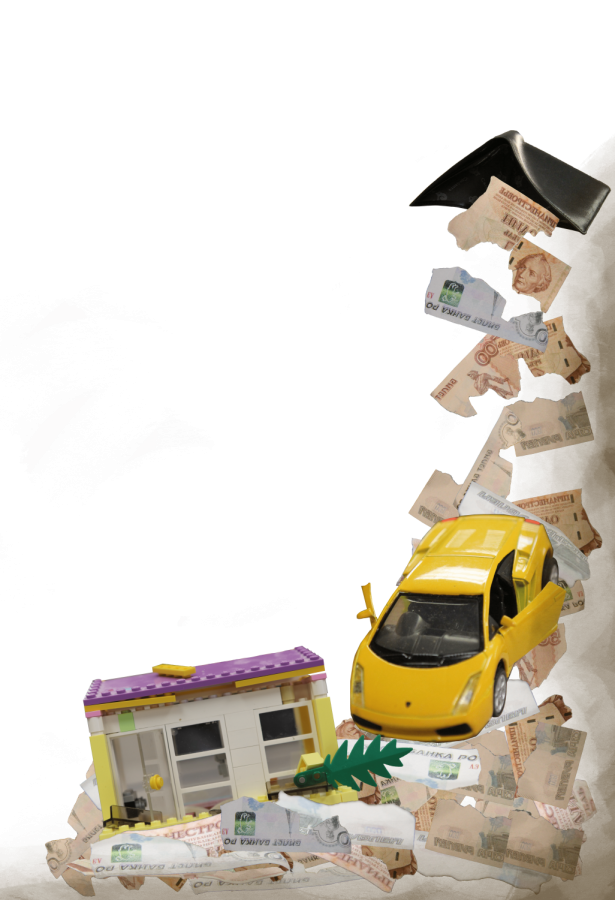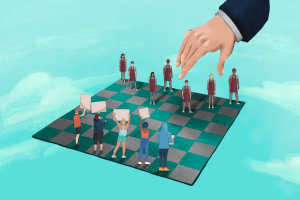All Russians affected by sanctions
Graphic illustration by Audrey Sun and Nicole Ge
Western sanctions have devastated the Russian economy, upturning the lives of the ultra-rich oligarchs and everyday citizens alike.
April 5, 2022
As Russia continues its invasion of Ukraine, many nations have attempted to punish Russia for its actions without direct military involvement. This has been done through sanctions, by which countries place economic punishments on Russian oligarchs, industrial tycoons who control a substantial share of Russia’s economy. According to Forbes, Russian billionaires have lost more than $126 billion in wealth since Feb. 16. Many in the West hope that preventing the oligarchs from living their luxurious lifestyles can inspire the elite group to persuade Russian President Vladimir Putin to end the war. But Western sanctions have not been limited to the super-rich — they have devastated the Russian economy, impacting everyday citizens as well.
The original Russian oligarchs made their fortunes in the 1990s as former Soviet state companies were offloaded to private bidders in corrupt deals following the Soviet Union’s collapse. During this period of market liberalization, wealthy businessmen acquired large stakes in Russian oil, gas, mining, transportation and agricultural companies.
In 1992, Russia implemented the Voucher Privatization effort, which allowed shares of 15,000 firms to be available to private buyers. While the aim was to allow ordinary Russians to buy shares, well-connected businessmen gave themselves large or controlling stakes in firms instead. Two-third of shares came to be held by company insiders. President Boris Yeltsin’s 1995 loan-for-shares scheme, in which a handful of well-connected businessmen bought stakes in major Russian companies, created many of Russia’s wealthiest oligarchs and was widely considered a scandal that slowed subsequent Russian economic growth.
A newer group of oligarchs mainly became wealthy through ties to Putin, with many of them being current or former Putin officials. Much of their wealth depends either directly or indirectly on the state. Oligarchs know their wealth is conditional on obedience to Putin, and if they do not support him, he can take their wealth away. In turn, some oligarchs have sold their companies back to the government.
Russian oligarchs, who normally are loyal to Putin, are seeing their wealth disappear due to sanctions. Since Russia started the conflict in February, 21 oligarchs have been hit with sanctions. Russian billionaires had often used American and European banks to funnel money and support their luxury spending, and 60% of Russia’s wealth was held overseas. Now, Western governments have started seizing their yachts, apartments and private jets. Oligarchs have also faced travel bans and are unable to go through EU or U.K. territory. One high-profile oligarch, Roman Abramovich, the owner of the Chelsea Football Club in the U.K. and an ally of Putin, was forced to sell the team after the U.K. froze his assets. Although the sanctions are quite strict, oligarchs are still managing to hide their money.
“Even though some oligarchs have had their luxury yachts confiscated, they avoid sanctions by using multiple identities to hide their money in tax havens like the Cayman Islands and now they are using cryptocurrency,” U.S Government and Economics teacher David Pugh said.
The plight of Russia’s ultra-rich is only one side of the story, however, as trade sanctions have devastated the economy and ordinary citizens as well. Western nations have removed Russia’s “favored nation” trade benefits, which gave Russia the best trading terms and made it less susceptible to tariffs. The loss of trade benefits could also lead to more sanctions in the future. Furthermore, on March 16, the U.S. House of Representatives voted to remove Russia and its ally Belarus from the free trade privileges that most countries have. Western countries have also reduced their imports of oil from Russia, a key industry. The U.S. completely stopped imports of Russian oil and natural gas, while European countries, which are more reliant on Russia for oil, are phasing out their use of it. President Joe Biden also signed an executive order on March 11 banning other imports from Russia, such as vodka, diamonds and seafood.
Corporations ranging from IKEA to Starbucks to Netflix have all stopped operations in Russia due to the war in Ukraine. Some companies, like PepsiCo, only closed parts of their operations, allowing for necessities like baby food to remain in Russia. However, the mass exodus of foreign products is causing shortages in Russian stores.
“By Western companies pulling out of Russia, it’s poorly impacting the economy and regular people who have jobs with those companies in Russia,” junior and Economics Club Secretary and Treasurer Anishka Banerjee said. “That’s the point, as the motivation behind withdrawals is to signify opposition to the invasion to companies’ consumers, and overall with sanctions, erode public support of Putin.”
The war has greatly impacted the everyday lives of Russians, as the economy declined and thousands of Russians were jailed for protesting the war. Russian currency, the ruble, has depreciated almost 20%. The Moscow Stock Exchange was closed for a month at the start of the war, and since its opening, stock prices have sharply dropped. Inflation rose 12.5%, and unemployment is rising as the country becomes more economically isolated from the rest of the world.
“The main problem with using sanctions to deal with a crisis that is happening in real time is they can take a long time to have an effect,” Pugh said. “It’s true that the ruble has plummeted in value, goods are becoming scarce and 30 years of economic growth is being wiped out, but there is no evidence to indicate that sanctions are affecting Putin or his inner circle. So far, only the Russian people are suffering.”
As the war continues, it remains unclear if sanctions on Russia are deterring them from continuing their invasion. Oligarchs impacted by sanctions are beginning to oppose Putin and the war, with many, such as Mikhail Fridman and Oleg Deripaska, calling for the war to end. Nonetheless, Putin seems to be committed to continuing to invade Ukraine.
“The war is going to go one of two ways,” said Forbes Journalist John Hyatt, who received an M.A. in business and economic reporting. “One is that it is going to be a sort of stalemate for a while, where Russia is not going to back down and is going to keep seizing and bombing these cities, while Ukraine just keeps fighting back. The second is that Russia comes to the negotiating table and strikes a deal with Volodymyr Zelenskyy, in which case, that would give Putin an off-ramp.”





























































